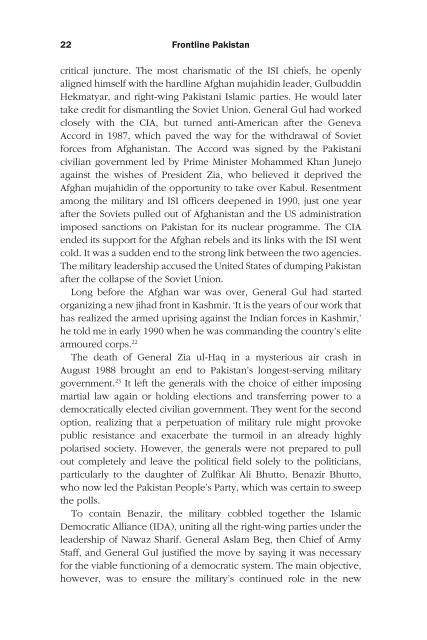Frontline Pakistan : The Struggle With Militant Islam - Arz-e-Pak
Frontline Pakistan : The Struggle With Militant Islam - Arz-e-Pak
Frontline Pakistan : The Struggle With Militant Islam - Arz-e-Pak
Create successful ePaper yourself
Turn your PDF publications into a flip-book with our unique Google optimized e-Paper software.
<strong>Frontline</strong> <strong><strong>Pak</strong>istan</strong><br />
critical juncture. <strong>The</strong> most charismatic of the ISI chiefs, he openly<br />
aligned himself with the hardline Afghan mujahidin leader, Gulbuddin<br />
Hekmatyar, and right-wing <strong><strong>Pak</strong>istan</strong>i <strong>Islam</strong>ic parties. He would later<br />
take credit for dismantling the Soviet Union. General Gul had worked<br />
closely with the CIA, but turned anti-American after the Geneva<br />
Accord in 1987, which paved the way for the withdrawal of Soviet<br />
forces from Afghanistan. <strong>The</strong> Accord was signed by the <strong><strong>Pak</strong>istan</strong>i<br />
civilian government led by Prime Minister Mohammed Khan Junejo<br />
against the wishes of President Zia, who believed it deprived the<br />
Afghan mujahidin of the opportunity to take over Kabul. Resentment<br />
among the military and ISI officers deepened in 1990, just one year<br />
after the Soviets pulled out of Afghanistan and the US administration<br />
imposed sanctions on <strong><strong>Pak</strong>istan</strong> for its nuclear programme. <strong>The</strong> CIA<br />
ended its support for the Afghan rebels and its links with the ISI went<br />
cold. It was a sudden end to the strong link between the two agencies.<br />
<strong>The</strong> military leadership accused the United States of dumping <strong><strong>Pak</strong>istan</strong><br />
after the collapse of the Soviet Union.<br />
Long before the Afghan war was over, General Gul had started<br />
organizing a new jihad front in Kashmir. ‘It is the years of our work that<br />
has realized the armed uprising against the Indian forces in Kashmir,’<br />
he told me in early 1990 when he was commanding the country’s elite<br />
armoured corps. 22<br />
<strong>The</strong> death of General Zia ul-Haq in a mysterious air crash in<br />
August 1988 brought an end to <strong><strong>Pak</strong>istan</strong>’s longest-serving military<br />
government. 23 It left the generals with the choice of either imposing<br />
martial law again or holding elections and transferring power to a<br />
democratically elected civilian government. <strong>The</strong>y went for the second<br />
option, realizing that a perpetuation of military rule might provoke<br />
public resistance and exacerbate the turmoil in an already highly<br />
polarised society. However, the generals were not prepared to pull<br />
out completely and leave the political field solely to the politicians,<br />
particularly to the daughter of Zulfikar Ali Bhutto, Benazir Bhutto,<br />
who now led the <strong><strong>Pak</strong>istan</strong> People’s Party, which was certain to sweep<br />
the polls.<br />
To contain Benazir, the military cobbled together the <strong>Islam</strong>ic<br />
Democratic Alliance (IDA), uniting all the right-wing parties under the<br />
leadership of Nawaz Sharif. General Aslam Beg, then Chief of Army<br />
Staff, and General Gul justified the move by saying it was necessary<br />
for the viable functioning of a democratic system. <strong>The</strong> main objective,<br />
however, was to ensure the military’s continued role in the new













